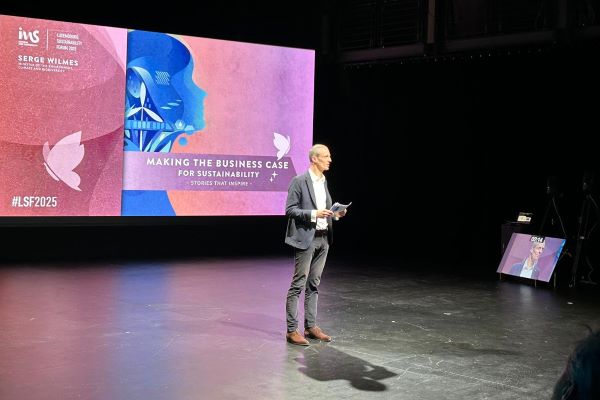 Serge Wilmes, Luxembourg’s Minister of the Environment, Climate and Biodiversity;
Credit: Elza Osmane, Chronicle.lu
Serge Wilmes, Luxembourg’s Minister of the Environment, Climate and Biodiversity;
Credit: Elza Osmane, Chronicle.lu
On Tuesday 25 November 2025, the local non-profit organisation Inspiring More Sustainability (IMS) held the fifteenth edition of the Luxembourg Sustainability Forum (LSF) at the Grand Théâtre Studio in Luxembourg-Limpertsberg.
In the full auditorium, the event brought together experts and business leaders from sustainability-focused, circular-economy, finance, technology and mobility companies to reflect on their role in shaping sustainable development and to exchange on current challenges.
The forum was held in French and English, with translation available through headsets provided to participants.
Serge Wilmes, Luxembourg’s Minister of the Environment, Climate and Biodiversity, opened the session titled “Making the Business Case for Sustainability: Stories That Inspire”. In his opening remarks, Minister Wilmes noted that Luxembourg is progressing in reducing CO₂ emissions and that the National Integrated Energy and Climate Plan (PNEC) provides clear, sector-specific measures to support companies in the climate transition. He stated: “We must maintain our motivation and not deviate from the trajectory, even when crises force us to adjust. Our ambition for the climate remains unchanged.”
Thomas Breuzard, Co-chair of B Corp France and Director at Norsys, delivered a keynote presentation about sustainability of economic activities in a “chaotic world”. He highlighted concerns around a recurring “backlash” narrative, stressed that public concern for environmental issues remains strong and underlined that businesses are increasingly confronted with the growing impacts of climate change and biodiversity loss.
The programme then continued moving from one speaker to another, each sharing a different insight. Jean Minne, CEO of Composil, described how the company reviewed its work after the COVID-19 pandemic and made durability a key part of its strategy, guiding how the company approaches maintenance, reuse and resource efficiency.
Arnaud Gillin, Co-founding Partner and Director at Innpact, followed with a reflection on the need for a regenerative economic model. He emphasised the urgency of shifting away from purely growth-focused models, stressing that “we have already crossed seven out of the nine planetary boundaries.”
The event also highlighted practical examples from companies such as how businesses are finding ways to reduce resource use, extend product life cycles and support ecological regeneration.
Clément Wampach, Managing Director of TK Elevator Luxembourg, outlined engineering solutions designed to reduce material use and emissions in building mobility systems. Through the presentation, he demonstrated how new elevator models significantly lower resource consumption.
Génica Schäfgen, Head of Ecosia European Union (EU), introduced their steward-ownership structure that safeguards the company’s mission and ensures that profits are not used for private benefit and described how all profits are used “to plant trees all around the world in biodiversity hotspots.”
The session also included contributions from other speakers, who shared their own approaches to sustainability and business transformation: Frédéric Baijot, Managing Director of Moulins de Kleinbettingen; Evelyne Barberot, Co-Director at GPA; Frédéric Lachêvre, President of Cool Roof France; François Neu, General Manager of Enerdeal Luxembourg; and Pierre Schmidtgall, Co-founder and Investment Director at Lita.
In conclusion, Anne-Marie Loesch from the Luxembourg Chamber of Commerce reflected on the practical value of the examples presented in the session. She noted that the speakers demonstrated “really concrete steps” rather than distant commitments and emphasised that these approaches show how sustainability can support performance, open development opportunities and become an integral part of company strategy.
EO









